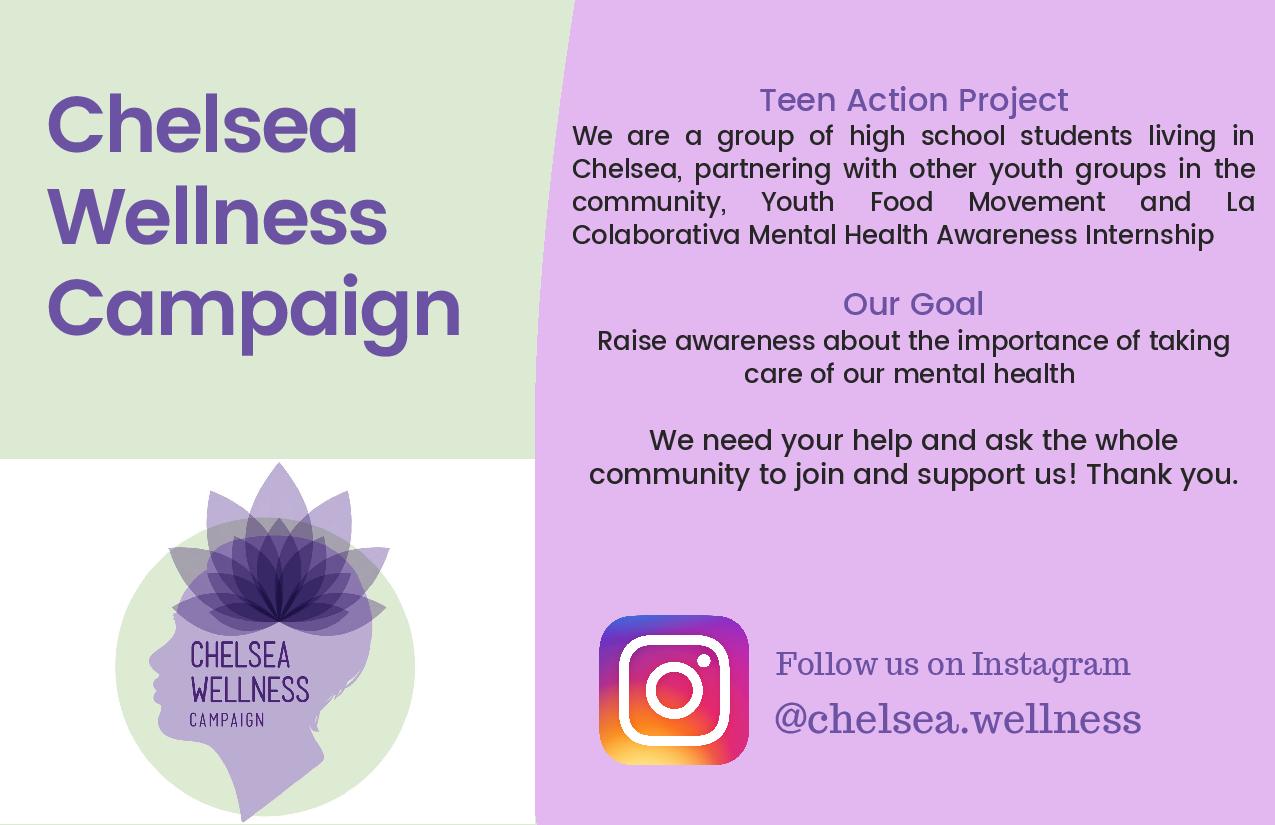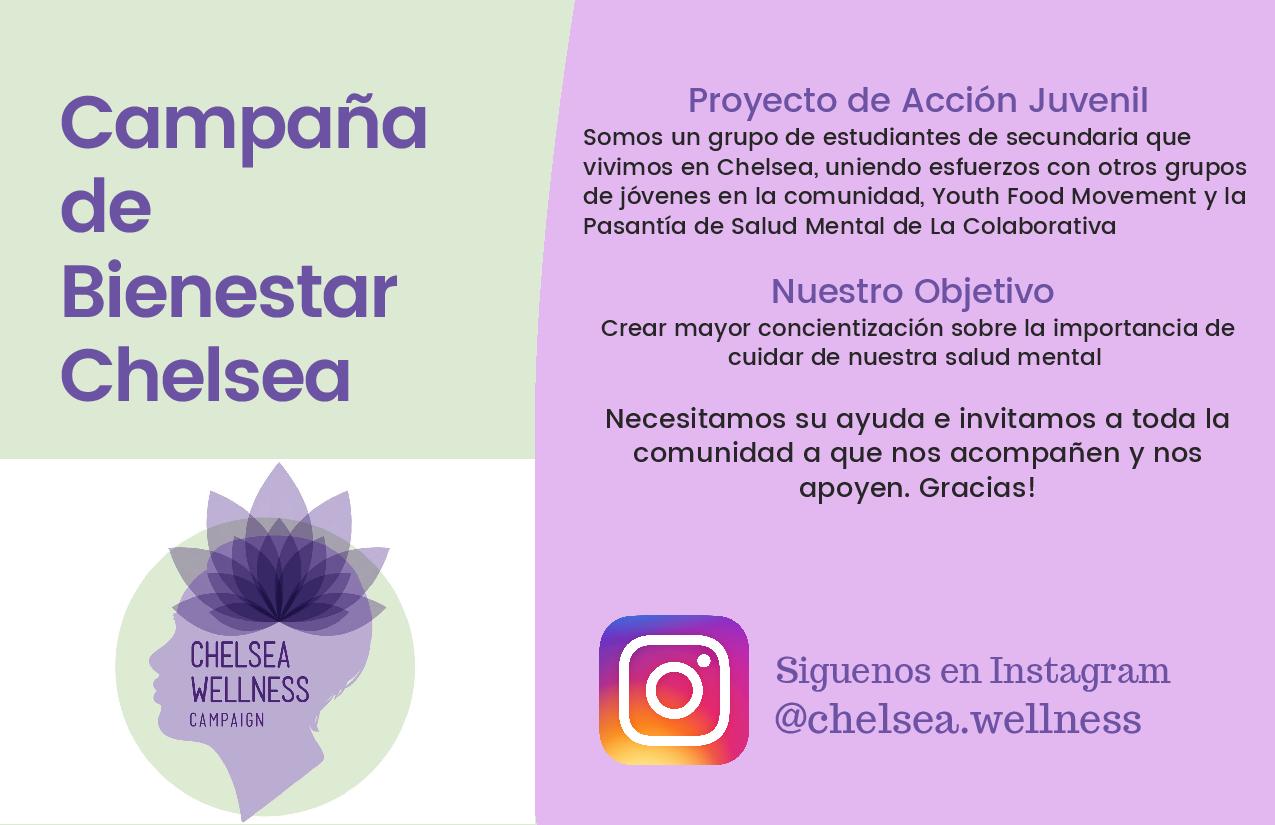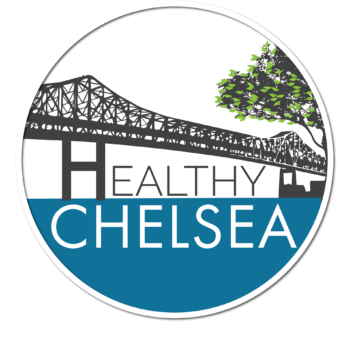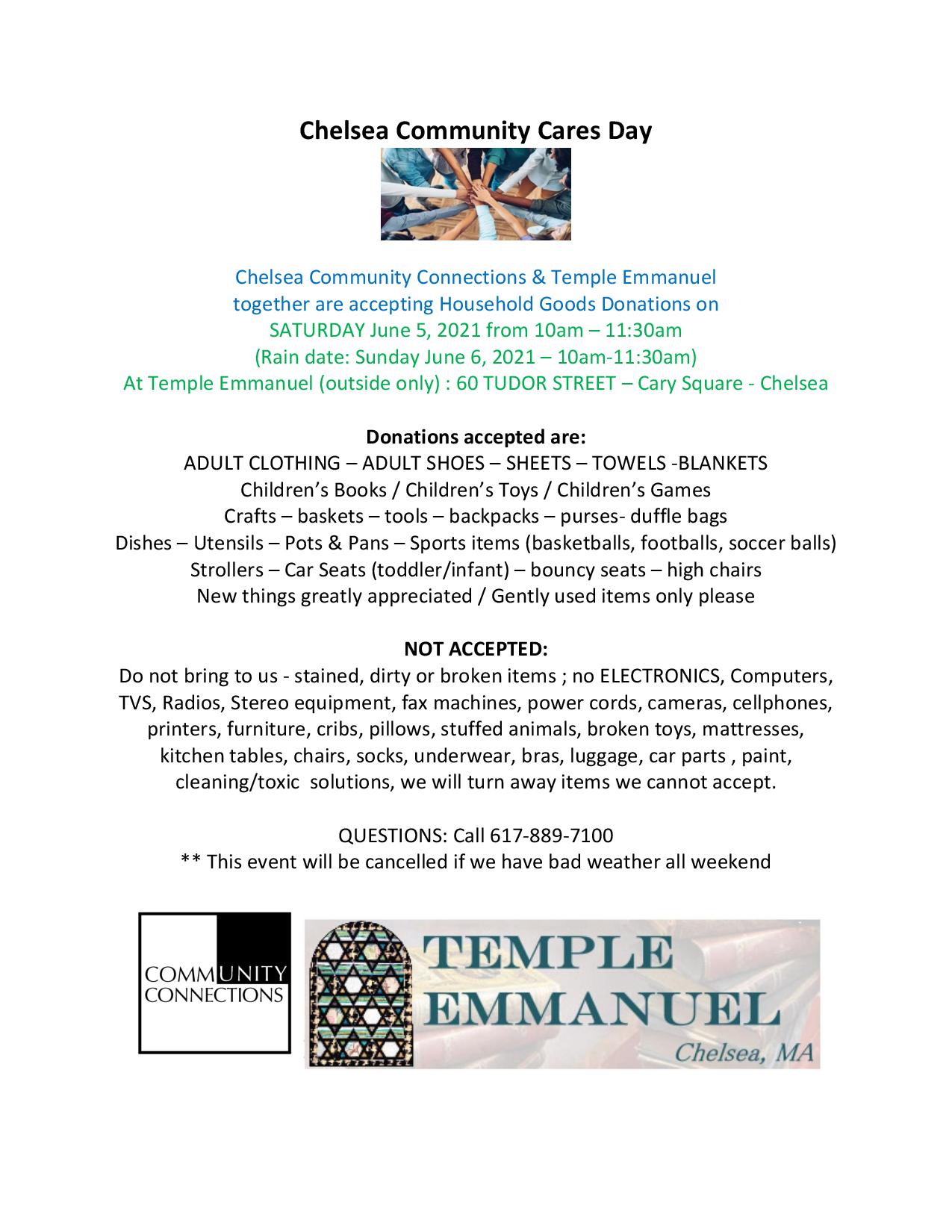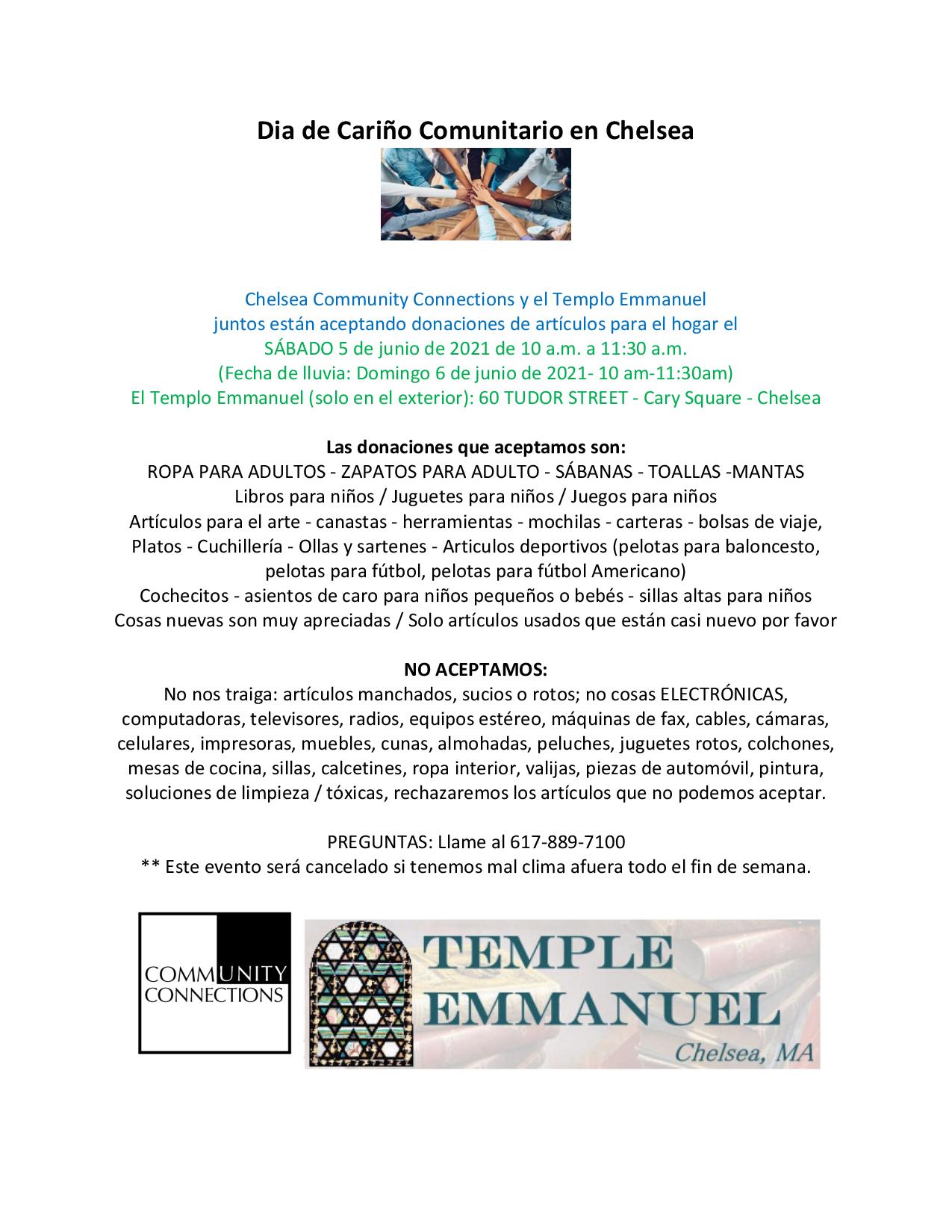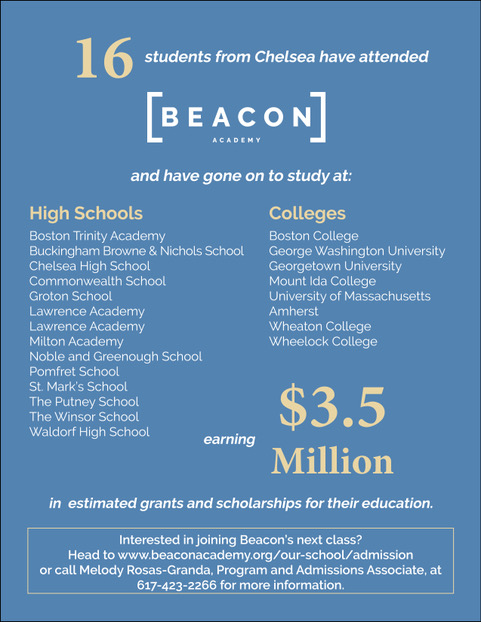The Bulletin Board is your place to find classes, ongoing programs, job listings, local contests, scholarships, and other opportunities. Events (one time & unique happenings) are also posted on the calendar. You may submit a post to the bulletin board here.
El Camino presented by Teatro Chelsea
El Camino is a walking theatrical experience where audiences explore downtown Chelsea and can watch short plays performed behind storefronts. This event is presented by Teatro Chelsea, the bilingual community theatre program with the Apollinaire Theatre.
Dates:
Friday, Saturday, Sunday
May 28, 29 & 30
(raindate Monday, May 31)
Time: 6 to 8 pm
Performance Locations:
- Bellingham Square Gazebo (Broadway and Hawthorne St)
- Gallery 456 (456 Broadway)
- Tattoo Calveras (345 Broadway)
- Global Cargo (412 Broadway)
- Apollinaire Theatre (189 Winnisimmet St)
- Chelsea Square (Broadway at Second Street)
General Admission and Guided Tours are Free.
Walking Tours
Chelsea is a city rich in culture and history. Through the winter and spring, a team of residents researched and developed walking, exploring different themes and neighborhood.
You can use the guides to walk the route yourself or to explore the information online.
The tours were developed by Ellen Rovner, Pepper Fee, and Lee Farrington with editorial and other assistance provided by Suzanne Perry.
Waterfront
Prattville
Jewish Chelsea
Public Art

Pop-Up Events in Chelsea Square
Every other Friday night we’ll have something new popping up in Chelsea Square. These low key events are a great way to welcome in the weekends!
These events are presented by Chelsea Prospers with Jukebox Event and a variety of community producers — like you!
Vinyl DJ Pop-Up
May 21, 6 to 9 pm
Groove it old school and meet the teams working on projects this summer to learn how you can get more involved.
5th Annual Chelsea LGBTQ Coalition Pride Flag Raising with Drag Bingo & Celebration
June 4, 6:30 to 9:30 pm
Presented by Chelsea LGBTQ Coalition
Ceremony of the Flag Raising with presentation by Star Chung of the Chelsea Police Department and performances by Veronica Vandersnatch
Spoken Word
August 6, 6 to 9 pm
Presented by Lorenzo Recupero with the Chelsea Poetry Walk
Local spoken word poets take to the stage to share their work. Play word games and take a tour to the sites where poetry can be found across the downtown.
Note: raindates are the following Friday evening.
All events are free. No registration needed – just drop by!
We are seeking vendors, performers and partners to participate in these events. Connect with us here

Roadway Murals
Colorful murals and creative cross-walks are coming to the downtown this summer to facilitate connections and safer travel through downtown.
We’ll continue the advancement of the art corridor of the Division Street Neighborway with murals across four blocks from Hawthorne to Park Street. Another roadway mural in Chelsea Square on one block of Winnisimmet Street will support events in the area.
For the Chelsea Square mural, celebrate Juneteenth with us during a community paint day at Winnisimmet Street. This event is a community celebration welcoming to all. Whether you have artistic abilities or no painting experience, join us for a fun day of connections, celebrations, and making art!
This project is presented by the City of Chelsea through its Housing & Community Development Department and Chelsea Prospers along with Neighborways Design. Funding provided by the Mass Department of Transportation Shared Streets and Spaces program.
Sign here for the Community Painting Day on Saturday, June 19 (raindate, Sunday 6/20)
Youth Vaccine Clinics
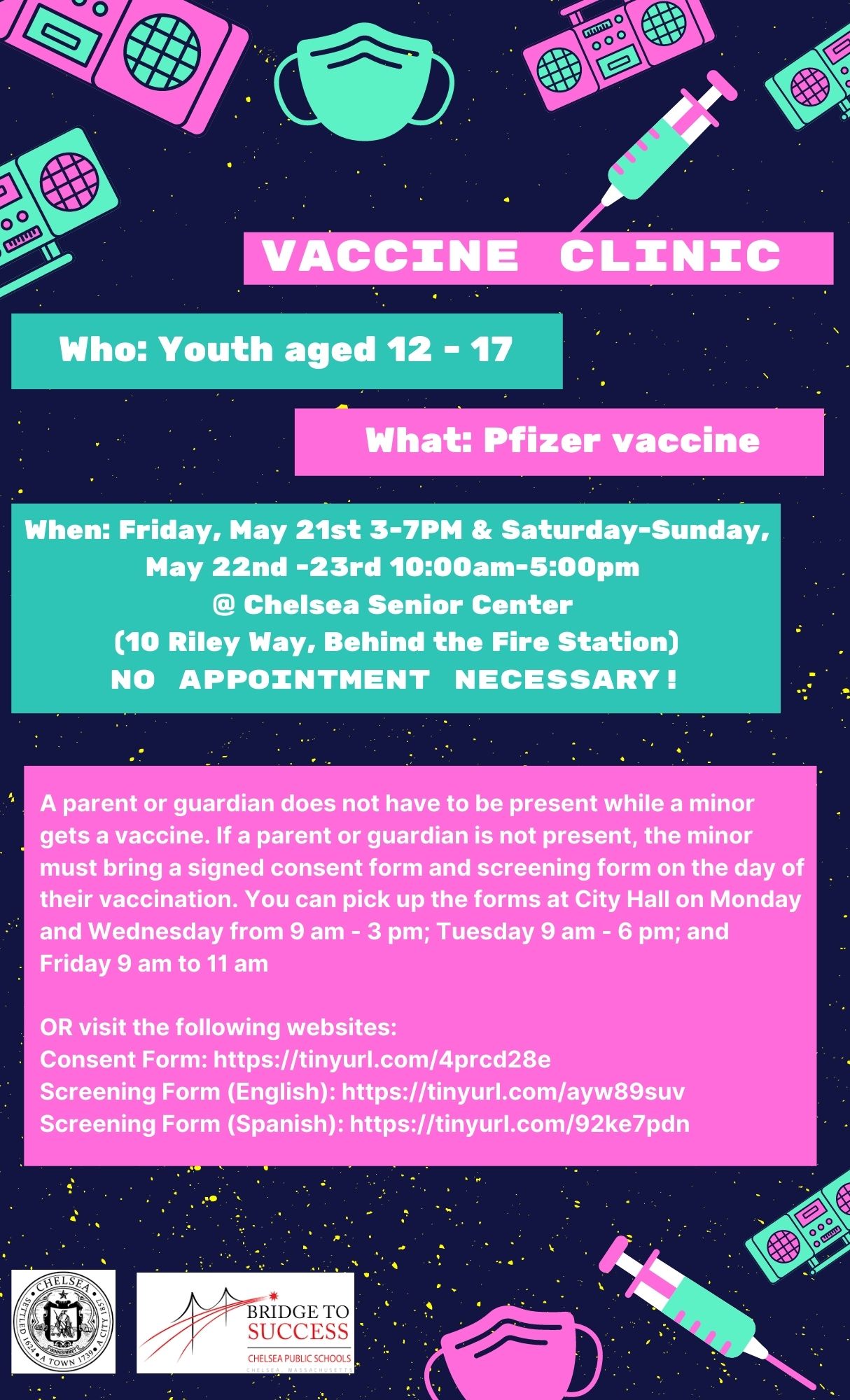
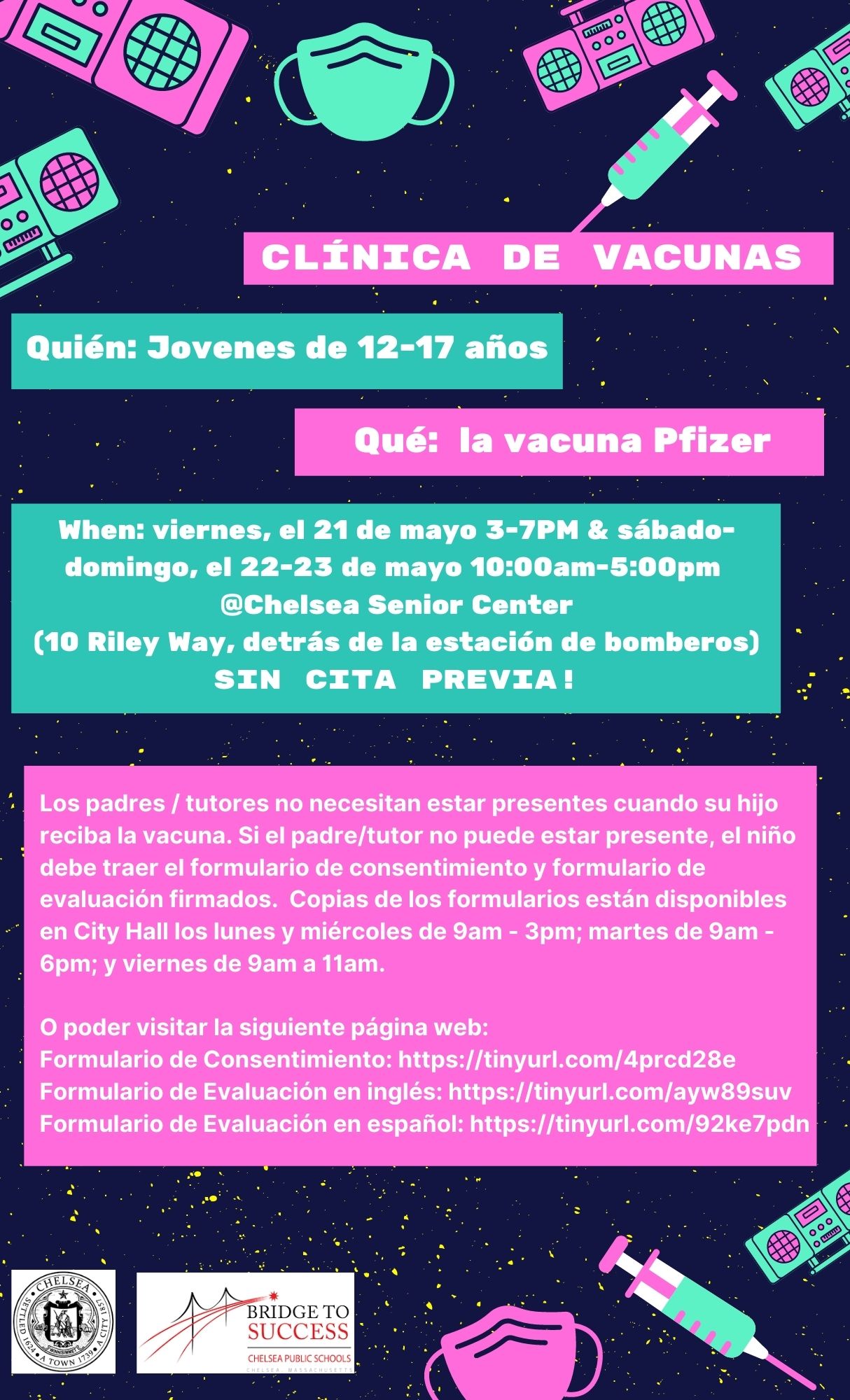
La Colaborative Now Hiring

Walk-up COVID-19 vaccine clinics Weekend schedule / Clínicas de vacunación contra COVID-19 de fin de semana SIN CITA PREVIA
Walk-up COVID-19 vaccine clinics – Weekend schedule
For Chelsea Residents (ages 12+), the Pfizer vaccine will be administered at the clinics listed below.
Friday, May 21
- Chelsea Senior Center (10 Riley Way) from 3 pm to 7 pm.
- La Colaborativa’s Food Pantry (25 6th St.) from 4 pm to 8 pm. (La Colaborativa team will host a youth clinic with music and a raffle).
Saturday, May 22
- Chelsea Senior Center (10 Riley Way) from 10 am to 5 pm. (We’ll have the Copsicle-1 Chelsea PD Ice Cream Truck).
Sunday, May 23
- Chelsea Senior Center (10 Riley Way) from 10 am to 5 pm.
- Highland Park (30 Willow Street) from 2 pm to 7 pm. (People who get vaccinated will receive one item of their preference (empanada, pupusa, or taco) and a soda)
Once you get the first shot, you’ll get an appointment for the second dose. Important information – If a parent or guardian is not present, the minor must bring a signed consent form and screening form on the day of their vaccination.
- Consent form
- Consent form (Español)
- Screening Form
- Screening Form (Español)
There are other languages available at https://www.mass.gov/lists/ma-consent-forms-for-people-under-18-years-of-age
Hard copies of the forms are also available at Chelsea City Hall during business hours (Monday and Wednesday 9 am – 3 pm; Tuesday 9 am to 6 pm, and Friday 9 am to 11 am).
For Chelsea Residents (ages 18+), the one-dose Johnson & Johnson vaccine will be administered at the clinics listed below.
Saturday, May 22
- Fitzpatrick/Prattville Apartments (51 Exeter Street), 9am to 2pm
Sunday, May 23
- Mace Apartments (449 Crescent Ave), 12pm to 5pm
Questions? Call 857-210-7677.
——————————–
Clínicas de vacunación contra COVID-19 sin cita previa este fin de semana
Para los residentes de Chelsea (a partir de los 12 años), la vacuna Pfizer estará disponible en las clínicas a continuación:
Viernes 21 de mayo
- Chelsea Senior Center (10 Riley Way) de 3 pm a 7 pm.
- Despensa de La Colaborativa (25 6th St.) de 4 pm a 8 pm.
Sábado 22 de mayo
- Chelsea Senior Center (10 Riley Way) de 10 am a 5 pm.
Domingo 23 de mayo
- Chelsea Senior Center (10 Riley Way) de 10 am a 5 pm.
- Highland Park (30 Willow Street) de 2 pm a 7 pm.
Una vez que reciba la primera inyección, obtendrá una cita para la segunda dosis. Información importante: si un padre o tutor no está presente, el menor debe traer un formulario de consentimiento firmado y un formulario de detección el día de la vacunación.
- Hoja de Consentimiento – Inglés
- Hoja de Consentimiento – Español (Español)
- Preguntas a la hora de vacunarse – Inglés
- Preguntas a la hora de vacunarse – Español (Español)
Hay otros idiomas disponibles en https://www.mass.gov/lists/ma-consent-forms-for-people-under-18-years-of-age
Las copias impresas de los formularios también están disponibles en City Hall durante el horario de lunes y miércoles de 9am a 3pm; Martes de 9am a 6 pm y viernes de 9am a 11am).
Para los residentes de Chelsea (a partir de los 18 años), la vacuna Johnson & Johnson estará disponible en las clínicas a continuación:
Sábado 22 de mayo
- Apartamentos Fitzpatrick/Prattville (51 Exeter Street), de 9am a 2pm
Domingo 23 de mayo
- Apartamentos Mace (449 Crescent Ave), de 12pm a 5pm
¿Tiene preguntas? Llame al 857-210-7677.
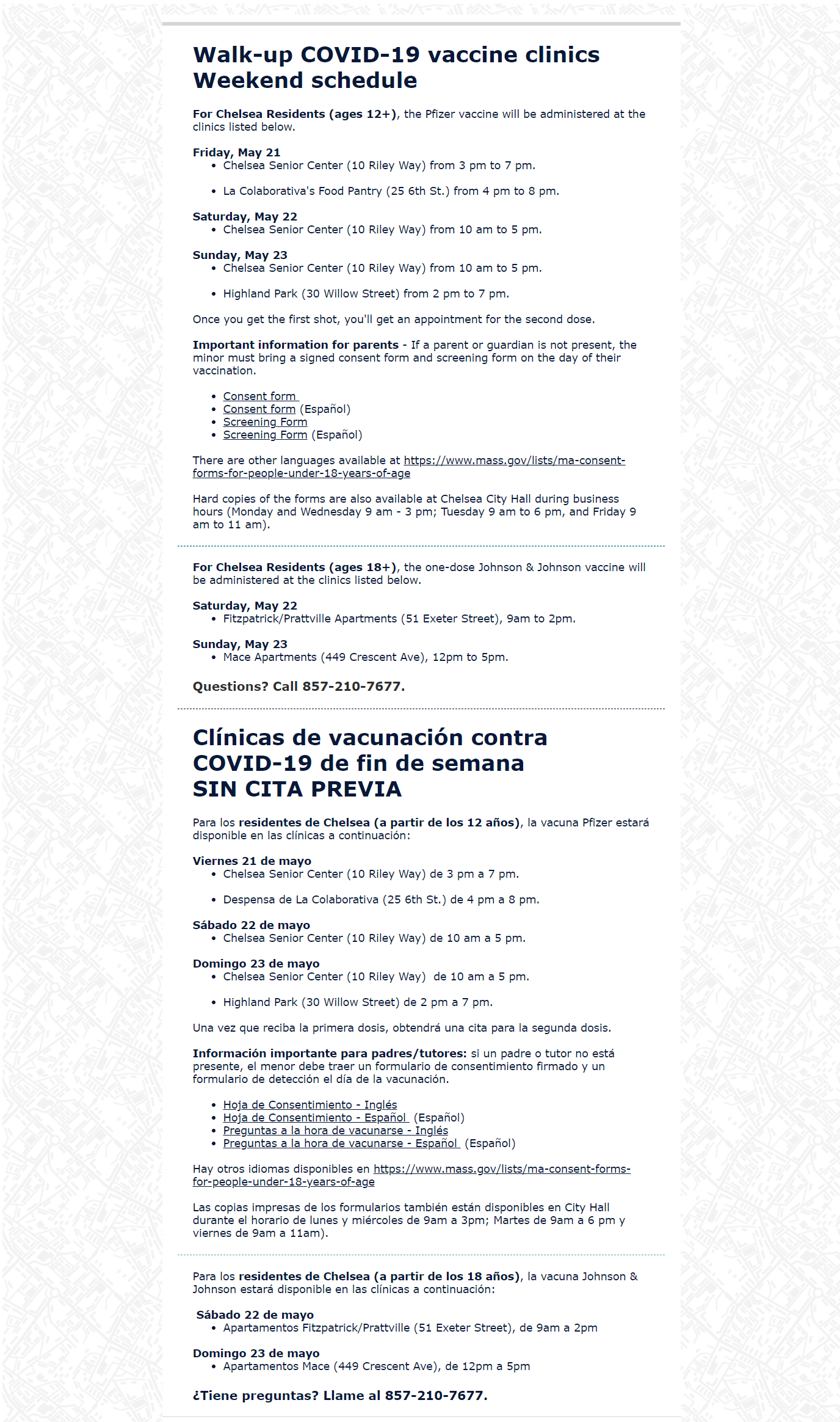


Chelsea Wellness Campaign / Campaña de Bienestar Chelsea
